- Home
- Lissa Evans
Crooked Heart Page 7
Crooked Heart Read online
Page 7
Noel slid her a look; she busied herself, sorting out change for the conductor, trying to stave off panic. He’d guessed what she was doing, she could see it in his eyes. She didn’t know how she could ever have thought him simple; he was the opposite – he was like one of those fancy knots, all loops, no ends. And he’ll tell, she thought. That’s what children do, unless they’re given a reason not to.
‘I expect you’d like more sweeties,’ she said. ‘Shall we stop off at Woolies on the way home?’
He said nothing.
‘Or some pocket money?’ she suggested. ‘A little bit of pocket money?’
He shook his head.
‘Well, what then?’ she hissed, close to his ear. And then, when he didn’t speak, she let out a sigh like a deflating tyre. ‘All right, all right,’ she said, bitterly. ‘First thing when we get to St Albans, we go to the Town Hall and give the money to the fund. Won’t all those councillors be pleased?’
‘No,’ said Noel. ‘I don’t want any more Spitfires. There shouldn’t even be a war, I don’t believe in it, I don’t care if we lose.’
Vee found herself feeling shocked. Even if you knew all the politicians were out for themselves, you had to want England to win, didn’t you?
‘Perhaps I ought to give them a bit,’ she said. She tried to imagine herself going up to a collecting box and actually putting money in. And being thanked, like Lady Bountiful. She’d just nod and not say anything; you wouldn’t want to show off.
‘No, don’t give them anything,’ said Noel. Mattie would never have given a penny.
‘So what do you want, then?’ asked Vee again. ‘You must want something.’
On the train journey back, he turned her query over in his mind, examining it, as if it were a puzzle to which he’d once known the solution. Since that frozen December morning when he had found Mattie on the Heath, her face a mask of putty, her feet cobalt, he had only not wanted things. It hadn’t occurred to him that anyone might ever ask him that question again.
Little brain-teaser for you, young Noel: what exactly would you like? Inside his head, the old life seem to expand, squashing the present into a thin rind. When Mattie had hugged him, it had felt like being enfolded in a mattress. He could see her heavy-featured face and hear the vigour of her voice. What shall we do today? Go and visit poor old Rameses II at the British Museum, see if he’s managed to unwrap himself yet, and then lunch at the University Club? Or would you prefer Lyons? Yes, better puddings there, I always think. Incidentally, did I ever tell you about Roberta in the British Museum, chaining herself to Laocoön and His Sons? Which London statues would you most like to have in the garden? Oh those are splendid choices, absolutely splendid – we shall have Nelson in the front garden, and Boadicea in the back, and on fine days I shall hang the tea towels from her chariot wheels . . .
He had never been bored with Mattie, never, never, never and now he was bored all the time, all the time; it was unbearable, like following mile after mile of grey string, with nothing at the end of it but a grim, distant, adult version of himself.
‘Here we are,’ said Vee, ‘chop chop.’
He followed her out of the station. ‘I want to do it too,’ he said.
‘Do what?’
‘Collect money, the way you’re doing.’
‘No,’ she said. A woman with a yellow headscarf was passing, and Vee nodded and called out ‘Hello, Mrs de Souza’, and the woman with the headscarf seemed not to hear her at all but went sailing straight past.
‘That’s Mrs de Souza,’ said Vee. ‘Her husband owns the shoe shop where my son used to work. They sell brogues for nearly ten pounds there, the leather’s like satin. She’s a snooty type.’
‘I want to help.’
‘No.’
‘Why not?’
‘It’d be wrong.’
‘So how come you’re doing it?’
‘You’re supposed to be limping.’ She looked up at the abbey clock. ‘We’re late, I need to be getting Donald’s tea ready.’
She started to walk faster. She was feeling rather frightened. It was like the verse in Hosea: she’d sown the wind and was reaping the whirlwind. She could almost feel the devil snapping at her heels.
‘I shall tell if you don’t let me,’ said Noel. ‘I shall tell that you’ve been soliciting donations under false pretences.’ They were just passing the blue lamp of the police station. He stopped walking, and made a feint for the door.
‘No,’ said Vee. They looked at each other. ‘They’d never believe a kiddie,’ she said.
Noel reached for the door-knob.
‘All right, all right, all right!’ Her voice was loud enough to turn heads on the other side of the street. She forced herself to start walking, her legs shaky.
‘In any case, I wasn’t going to do it again,’ she said.
‘Why not?’
‘It’s not as easy as you’d think.’
She risked a glance at him. He was walking beside her, his stride matching hers.
‘All things are difficult before they are easy,’ said Noel.
4
In the cubicle of the gents toilet at Leicester station, Donald re-read the letter and then took a hand mirror out of his pocket. He combed his hair, and gave his teeth a wipe with a scrap of paper. Then he ran a finger over his moustache. He’d only had a month to grow it, and it wasn’t half bad – it suited him, in fact, made him look very much like Robert Donat in The Thirty-Nine Steps. Pity he’d have to shave it off again next week.
Outside the cubicle, the man who’d been retching into the urinal shuffled away. Donald heard the exterior door open and then close again. For a moment, the only noise was the trickle of water.
‘What’s the matter?’ he asked, out loud. ‘A heart murmur? What’s that when it’s at home?’
He looked into the mirror again, and tried out an anxious expression; he found he could make his chin wobble if he really put his mind to it. ‘Oh, Christ Almighty,’ he said, his voice cracking. ‘Am I going to die?’ No, he thought: too much. You didn’t want to overplay.
Exiting the station, he bought a copy of the Daily Express and stood with his back to the war memorial. Immediately, a chap wearing too much hair-oil detached himself from the queue outside a tobacconist and walked straight towards him. Donald met him halfway.
‘Fielding, is it?’
The man nodded. ‘Pint?’ he asked. ‘We’ve got time.’
‘I’d like my money first,’ said Donald. ‘And what happened to your moustache? You said you had a moustache.’
‘My girl didn’t like it.’
‘I’ve been growing it specially,’ said Donald. ‘I should charge you extra.’
Fielding shrugged. ‘Didn’t cost you, did it? Come through here.’ He jerked his head towards an alley between adjacent shops.
Donald took his time counting the cash, enjoying the feel of the notes. He hadn’t known how much to ask for, the first time; he’d thought that thirty sounded a good whack, and then he’d seen the leap of relief on his first client’s face, and had begun to know his own worth. Eighty-five was his rate now, and he was thinking of upping it again.
‘All right,’ he said, stowing the wad away in an inside pocket.
‘A pint?’ asked Fielding again. He was obviously the nervy type. He chose a crowded little pub across the road from the station, and led Donald into the snug.
‘I’ll take a brandy,’ said Donald.
Fielding winced. ‘Have a heart,’ he said, ‘after what I’ve just handed over?’
Donald shrugged. He didn’t like brandy anyway; it was the principle of the thing: beer for friends, brandy for business. Not that he liked beer much either. He’d been thinking lately about trying wine. He’d go into a restaurant some time, and give it a go. White. Red. French names.
‘Got you a port,’ said Fielding, returning from the bar, his own pint already a third gone.
‘Is it far to get there?’ asked Donald.
Donald took a Woodbine, though lately he’d found he was losing his taste for cigarettes. Cigars, he thought. I’m probably a cigar man. I should get a humidor.
‘I expect you want to know why I’m dodging out?’ asked Fielding. ‘I’m not a coward or nothing.’
Donald smelled the drink and put it back on the table. ‘I don’t have to know,’ he said. ‘It’s none of my business.’
‘It’s my girl,’ said Fielding. He checked over his shoulder. ‘You wouldn’t believe it if you saw her, she’s a dream. You know Rita Hayworth? Rita Hayworth’d look like a fucking bulldog next to my Joan. And you know what, she loves me, she’s all over me.’ He paused to sup his beer. ‘But girls like that,’ he said, ‘they get their heads turned, don’t they? I go away, some flash geezer comes up and buys her a fur coat and next thing I know it’s “Dear Phil, I’m tired of waiting for you, I want someone who’ll look after me proper.” I can’t take the risk.’ He finished his pint and eyed the empty glass with contempt. ‘Piss,’ he said. ‘Might as well hold it under the tap. You got a girl?’
‘Not at present,’ said Donald.
‘When I first saw her, I thought someone’d tapped me on the head with a sledgehammer, I swear to God. I was at the Tivoli, and I turned round and there was Joan, and I looked back at the tart I’d come with and I might as well’ve been dancing with a fucking chair, so I said to her, I said . . .’
Donald stopped listening. He didn’t like swearing, never had, it was like someone waving a muddy fist in your face. Fielding’s girl, Joan, was clearly no good, and it was obvious that Fielding was going to get the shove sooner or later, once she’d picked his wallet. It was amazing that Fielding hadn’t twigged this, but like most people, he hadn’t taken the trouble to actually study the way the world worked. Donald had. Snide types in the past might have accused him of sitting around not doing much, but he’d been observing the whole time; his eyes were like spy cameras, whizz snap, missing nothing. And then afterwards, lying in bed (not sleeping, thinking), he’d analyse the pictures and tease out the patterns. For a start he’d seen that most blokes were fools with women: they bounced around like billiard balls, one kiss and into the pocket. They didn’t realize that there was never any sense in rushing. His mother was always rushing, it made him tired just watching her, like seeing a fly bang itself against a pane of glass, over and over again. And it never got her anywhere, did it? Whereas he was on the up. He had bided his time and then a window had sweetly opened.
Fielding was still talking: ‘. . . bought her a ring with a diamond cluster and stuck it under me tongue, and said, “Kiss me, baby” and she said, “Ooh you shouldn’t of.” Nine carat, I had to pay a pony.’
‘You got the papers?’ asked Donald.
Fielding felt in his pocket, and handed over the letter and his identity card. ‘We better get going, I s’pose,’ he said, and started to gnaw at a nail. ‘What else do you need to know about me? Dad’s name? School and that?’
Donald shook his head. ‘They never ask. Sometimes they want to know what job you do – look at your hands, test your muscles, that sort of thing.’
Fielding held out his palms, pink and unmarked.
‘Bookie’s runner,’ he said.
‘Are you?’ Donald felt mild interest. He’d never been to the races, wasn’t interested in horseflesh, or betting, but in newsreels he’d seen the winner’s enclosure, champagne foaming, ladies with haircuts that cost a tenner, so much class you could smell it. ‘Where do you work?’
‘All over, travelling all the time,’ said Fielding. ‘The bookie’s me uncle, see, he’s going to sign me over the business one of these days.’
‘Racing still going on, is it? With the war and everything?’
‘You bet.’ Fielding sniggered at his own joke and lit another cigarette. ‘They’ve chopped it back, only six courses open, half a day a week, but that just means the stakes are higher, don’t it? Another reason not to join Fred Karno’s Army. Come on, then.’
They walked through hazy sunlight towards the drill hall. A street away, Fielding hung back. ‘I’ll be in there,’ he said, nodding towards a pub. Donald joined the queue of men snaking from the entrance. There was the usual smell of anxiety, the usual jokes and rumours.
‘I heard if you slip a tenner to the head doctor, he’ll get you a desk job.’
‘I heard if you slip him a length, he’ll get you into the WRENS.’
There was a burst of laughter.
‘I got flat feet,’ said a chap who looked half-witted. ‘They won’t put me in the army, will they?’
‘RAF,’ said the sharpie who’d made the crack about the WRENS. ‘They get all the blokes with flat feet together, and send them off to tread down the lumps on the runways.’
‘Serious, though,’ said the half-wit, worriedly. ‘Do you think they’ll pass me fit?’
A discussion began, and then an argument.
‘I tell you, you gotta be using a bloody white stick before they let you off for eyesight.’
‘Flat feet, though—’
‘My brother, right, my own brother got ’is medical discharge for a fucking ingrowing toenail so don’t go telling me I don’t know what I’m talking about.’
‘But my flat feet, right—’
Donald unfolded the Express and began to glance at the headlines. He felt entirely calm, much as he had at his very first medical board. That day had been glorious; it hung in his memory like a silken banner. All his life, he’d been waiting for the moment when he’d be lifted out of the mire. What he’d been born into was all wrong for him – the makeshift shabbiness, cheap cuts of meat and darned sheets, the daily muddle – he belonged to a higher class of existence and he’d always known this, absolutely, as if he’d carried a fairytale birthmark on his shoulder in the shape of a crown. The only thing that had ever made his existence bearable was the utter certainty that at some point things would change. That day in Bedford, as he’d progressed round the draughty interior of the Town Hall having his ears probed, his belly prodded, his privates fingered, he’d sensed, somehow, that his moment was coming. As if he’d heard a distant trumpet call.
‘Ah. Now . . .’ the doctor had said, his stethoscope pressed against Donald’s chest, ‘has anyone ever told you that you have a heart murmur?’ Another quack had come over, and they’d listened and nodded, and marked him Unfit for Service, and then Donald had had to take a letter to a hospital specialist, who had given the verdict, in writing, of Congenital Pulmonary Regurgitation. It was something to do with the blood vessels to the lungs and it was, said the specialist, unusual, untreatable and unlikely to cause symptoms for many years.
Unusual.
Untreatable.
Unlikely to cause symptoms for many years.
The description had seemed to float up like a triple fanfare, three gifts on a golden tray, a trio of gilded doves. Donald Sedge would be excused drudgery. Donald Sedge would not be square-bashing with the rank and file. Donald Sedge was a rarity, ill yet well, fragile yet robust, officially possessed of a heart unlike others. ‘Now don’t worry, Mr Sedge,’ the doctor had said, mistaking euphoria for terror. And miracle had succeeded miracle because that very afternoon, Donald had been hailed by the chap who’d been standing behind him at the Bedford medical. He’d let out a slow whistle when he heard about the murmur. ‘You’re quids in,’ he’d said. ‘Some blokes’d pay through the nose to have you stand in for them.’ Donald had wisely kept his mouth shut, only shaken his head disapprovingly, but word had got out, and only two days later someone had turned up at Croxton’s yard with an offer. The first of many.
In the beginning, he’d put the money in a shoebox under the bed. That was full now, and the overflow was going into an old Gladstone bag. It sat on top of his wardrobe, pregnant, waiting for the hour.
The queue started to move.
> ‘What if I say I’m a conchie?’ asked Flat-Foot, panicking.
‘They’ll take you out the back and shoot you,’ said the man behind him. ‘’Ere, what’s the difference between an egg, a hen and Hitler? An egg wants sucking, a hen wants plucking and Hitler wants—’ He gave a leer and waited for laughter.
‘If you were a real conchie, you wouldn’t even come to the medical,’ said a prim-looking boy with spectacles. ‘And anyway, Hitler does want fucking, doesn’t he?’ Coming from his tidy little mouth, the phrase sounded extraordinarily filthy and there was a cackle from someone in the line. The boy flushed. ‘Well,’ he said, defensively, ‘I think he needs to be stopped, and I don’t see why I should leave it to other people. And I can’t be the only one here who thinks that.’ He looked around, jerking his gaze from one man to another.
‘No, you’re not the only one,’ said Donald, quietly. All eyes turned toward him. He said not a word more, just folded his arms. There was a moment of respectful silence, and then a man with a clipboard appeared between the double doors and shouted ‘Next twenty,’ and the line shuffled forward. The prim boy gave Donald a little nod. I could give lessons, thought Donald. I’m good at this.
It was a slow afternoon, one queue and then another, read the top line, close your eyes and raise your finger when you hear a noise, can you feel this pin jabbing into your leg? I’m doing this for the first time, Donald kept reminding himself; mustn’t look as if I know what’s coming. Touch your toes, cough, walk along this line.
The chest doctor was a short man, with hair like the bristles of a scrubbing brush and flaking skin. ‘Breathe in,’ he said, ‘breathe out, say ninety-nine.’ The cup of the stethoscope hopped across Donald’s back. ‘Now turn,’ said the doctor. Donald revolved. His moment was coming; he kept his face impassive. The doctor’s hand, as rough as a washerwoman’s, pressed the stethoscope into the soft flesh below his left nipple. There was a fractional pause and then a crash from the other end of the room, followed by a volley of shouts.
‘Christ!’ said the doctor, departing at a loping run towards a prone figure. It was the half-wit, who appeared to have fainted, striking his head on a table on the way down. There was a quantity of blood.

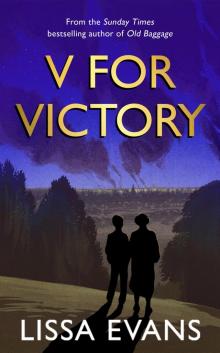 V for Victory
V for Victory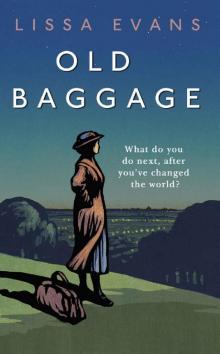 Old Baggage
Old Baggage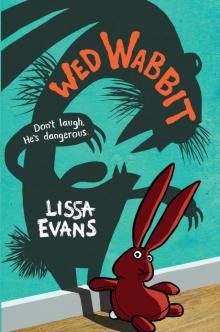 Wed Wabbit
Wed Wabbit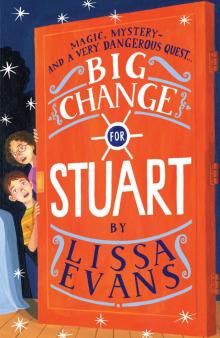 Big Change for Stuart
Big Change for Stuart Spencer's List
Spencer's List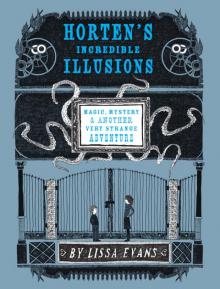 Horten's Incredible Illusions
Horten's Incredible Illusions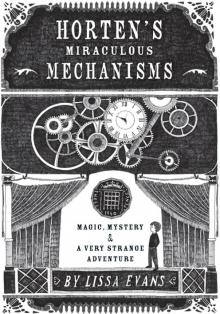 Horten's Miraculous Mechanisms
Horten's Miraculous Mechanisms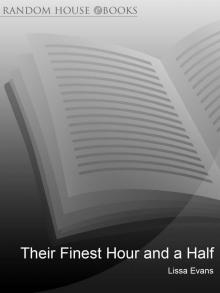 Their Finest Hour and a Half
Their Finest Hour and a Half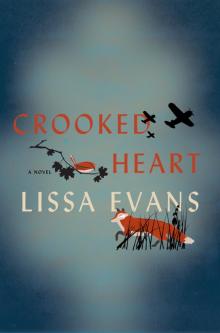 Crooked Heart
Crooked Heart